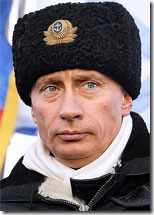Note: Having no desire to answer the same questions time and again in different comments in different articles, I am posting this primarily for the referral of future commenters. So please consider this a FAQ of sorts.
As far as Obama continually insulting the British, (not to mention other dignitaries), and my pointing out the facts as I understand them:
I am not any sort of an apologist for the British, (or, you will find, anybody-the-hell-else): My father was treated quite—I'll be civil—shabbily by Brits as an American stationed in England for a time during World War II and thereafter never had a kind word for them—far from it. I have nothing against the British as a people—many of whom are among the warmest, friendliest people I've ever met—I'm a rabid Dr. Who fan and I have respect for Her Majesty The Queen as an entity separate from her government. But for reasons of personal experience I have absolutely no love for the British government—again, far from it.
Putting my personal feelings aside—as Obama or any holder of political office in the United States is expected to—I recognize the blatantly obvious political, diplomatic, military, economic and scientific needs to maintain the alliance the US has had with the UK for generations.
As to my motives for anything I say about any politician:
I am neither a democrat or republican. In my observation and experience, all politicians are lying scoundrels, (or become so, soon after taking office), possessed of their own agendas which always benefit them and rarely the voters. Consequently, when I cast my ballot, I vote for the lesser of two evils; sometimes the lesser scoundrel is a democrat sometimes a republican, sometimes a libertarian and when the candidates tie as low-life miscreants I may write-in Thomas Jefferson, Teddy Roosevelt or my cat. Those who peruse this site in its entirety will note that I point out McCain's idiocy as readily as Obama's. I am, as of the above date, preparing to lambast some other republican scoundrels—stay tuned.
Politicians are civil servants, no matter how much they like to perceive themselves as civil masters. They work for you. They work for me. Political malefactors of any persuasion need to have their chicanery and bad behavior pointed out.
Do I believe it's my job to do so? No. Do I feel I'm going to Save All Mankind? Don't be silly. I am simply exercising the natural and inalienable right that all people have: I'm putting in my two-cents. Take it or leave it.
Regarding Obama's disgraceful behavior towards the British, the question was asked:
"But how can we expect someone whose grandfather was tortured by the British under Churchill to feel the same way about him?"
It is entirely possible that Obama's grandfather was tortured by the British—I wouldn't doubt that such a horrible thing may have occurred. I find it curious, however, that there seems to be only one media report on this torture story which has been recounted—essentially verbatim—in many, many media outlets. Yet Obama himself has said nothing about such torture and his own account of his grandfather's treatment by the British in his book Dreams of my Father differs from that media account. They can't both be true. Where does the truth lie?
Regardless of the truth of that allegation, the President is expected to act on behalf of the American People—not on his own personal hatreds. Look at Nixon, who, as President, acted on little but his own personal hatreds. Want him back?
As to Churchill:
"Sir Winston Churchill has been named the greatest Briton of all time in a nationwide poll attracting more than a million votes."
(ref: http://news.bbc.co.uk/2/hi/entertainment/2509465.stm)
The British, under Queen Victoria, supported the Confederate States during the American Civil War. What do you suppose would be the American reaction—or Obama's—if a newly-elected British prime minister rudely and unceremoniously booted out a bust of Abraham Lincoln at 10 Downing Street? (Note: Please read this article in its entirety for my complete take on this issue.
Winston Churchill met with Charles de Gaulle and Joseph Stalin at the end of World War II—two men he passionately loathed. Under trying circumstances, he behaved as a gentleman toward them no matter how much he groused about them behind their backs. Obama could learn a great deal from Churchill. Don't hold your breath, though.
And then there's the slave thing:
"Michelle Obama's great-great-great grandfather worked as a slave"
"Obama's Ancestors Were Slave Owners"
Now, I'm Scots-Irish. You won't hear me going on about the bloody Viking invasions of Scotland and Ireland and the resultant murder and enslavement of my ancestors or how modern-day Scandinavians should be made to feel ashamed and to share in the guilt of those atrocities, because it would be just damn silly. Lunatic.
You won't hear me going on about how the Irish, (especially Irish Catholics), under British domination—slavery—in the 1800's starved to death in the hundreds of thousands, were deprived of most of what we consider basic human rights, were treated as little better than animals, were branded criminals for little or no offense and transported—men, women and children—to penal colonies in Australia and elsewhere.
Yet there are those—white and black—who refuse to put the slavery thing behind them and still gnash their teeth and beat their breasts about it, just as there are people today who hate all living Jews because a handful of Jews, who died 2,000 effing years ago, crucified Christ—never mind that Jesus himself was a Jew. Lunacy.
Yes, all these things are horrible to read about. Painful to contemplate. But they are things of the past: The actions, hatreds, travails and sufferings of people generations and centuries dead. It's history. I, for one, choose to live in the here and now.
White Guilt:
How many of you reading this own slaves? No one? Neither do I. Neither did my parents, nor theirs, nor theirs, nor theirs...
I did not cause slavery. I did not promote slavery. I did not end slavery. I was not involved at all.
I am not responsible—and I refuse to be held responsible by anyone in any way, shape or form—for anything, anywhere, which occurred before I was even born. If you choose to believe differently, you are mentally unbalanced.
Black Angst:
On this page: http://voices.washingtonpost.com/postpartisan/2008/11/black_angst.html a self-professed black American left, in part, this plaintive comment:
"...try to imagine what it has been like for generations of blacks trying to move past the effects of over 200 years of slavery, followed by another 100 years of oppression thanks to our good buddy Jim Crow and others. 300 years. Three HUNDRED Years. 40 years is not enough time for all of those feelings to heal or to move past the results of centuries of institutionalized racism." [Emphasis, mine].
My response is this:
Crap.
What a lame, racist, excuse to blame others for the inner misery in which you have chosen to wallow.
Go to Japan sometime. You'll be treated—almost certainly—very well because it is in their culture to be polite. Whatever color you are—as long as you aren't Japanese—ask a man there for permission to date his daughter and all of a sudden you're a gai-jin pal, and boy-o-boy then you'll see the politeness vanish and the racism appear.
I've been to countries where there hasn't been slavery in a lot more than three hundred years and people of other colors or simply different nationalities are nonetheless treated differently—often insufferably and sometimes violently so. If you are fortunate, you will be tolerated.
I'm white and I've been treated differently by, (some), black neighbors, shopkeepers, politicians—even police officers—simply because of my skin color. I wasn't unkind to them, never said a bad word to them, but they reacted to me as though I had personally bought and sold their great-granddaddies. Sometime their behavior toward me was standoffish, sometimes harsh, sometimes threatening. Two of them burned my house down, so I don't live in that neighborhood anymore. Racists, pure and simple. Their racism is their problem, not mine: I've got better things to do.
Their words, actions and attitudes didn't change my behavior, my opinions or my self-esteem and certainly never have and never will have any part whatsoever in defining who I am or how I feel about myself. I define who I am; other people—living or dead—do not.
Read the Bible, the Koran, the Talmud—read history. This—slavery, racism—isn't an American thing and it isn't a recent thing; its been going on in thousands of places for thousands of years and—sad as it may be—things aren't going to be any different when you wake up tomorrow or the next day or the day after that.
So listen up, Bub. I don't give a levitating rodent's patootie if you're black, white, brown or yellow, or what kind personal hells you have decided to create for yourself. If you are going to whine about it, moan about it, despair about it and "oh, poor me" about it—all the while sitting on your hands and waiting for things to change—you are going to waste whatever life you have left. And it won't be my doing or Jefferson Davis' doing or Jim Crow's doing. It will be your doing.
Whatever you may think about Obama and however Obama may feel about this issue, you can credit him with one thing; putting it behind him long enough to make himself the first black President. Think about that.
As long as people, whatever their heritage, insist on perceiving the world in terms of color—racially, which is... now let's not always see the same hands... yes, Johnny, it's racism—their angst and guilt will continue unabated: There will always be a part of them that is miserable, there will always be a part of them which lives in fear, and they will have no one—living, dead or yet to be born—to blame but themselves.
It sure as hell ain't my fault.
Having said all that, lets again explore Obama's behavior toward the British:
Every President is expected—indeed, required—to behave as a statesman.
My grandfather was born in 1873—he was alive when Custer was. At one point, in Texas, the neighbors—best friends—of my grandfather and grandmother were—the only appropriate word is "slaughtered”—by Indians and my grandparents had to flee their home, barely escaping the same fate.
Now that was bad enough, but what if my grandfather or grandmother, (perish the thought, and may they rest in peace), had been captured and tortured by the Indians? And what if one of their descendants, (and there are a great many; my grandparents had 28 children. No, that's not a misprint), what if one of their descendants were elected President of the United States? How would the American people today expect—require—that President to behave toward the Crow or the Sioux or the Kiowa or the Comanche?
The President is expected to behave like a head of state and not a racist or Anglophobe or Russophobe and so-on ad infinitum.
(Before the amateur mind-readers out there start howling, I have many friends who represent several Native American Nations, (tribes, to the uninformed)—and Lou, if you're reading this, I mean you especially, dear.)
But lets cut to the chase and look at the very essence of the question regarding Presidential behavior:
Should the President of the United States—a public servant and the ultimate representative of the American people, whose decisions and actions affect certainly over 300,000,000 people and potentially billions—let his personal feelings color those decisions rather than basing them on the pros and cons of the facts alone? Should he not be held to the absolute highest standards?
Let's look at a comparatively recent event. Please keep in mind that the situation was far more complex than I am making it appear here, and therefore this may be considered by many a simplistic view—I won't argue that. Whether history ultimately reveals it to be true or not true, it nevertheless serves as an excellent example:
Many believe the deciding factor in President George W. Bush's decision to invade Iraq in 2003 seems to have been that Saddam Hussein—in Bush's words—"tried to kill my dad."
(ref: http://archives.cnn.com/2002/ALLPOLITICS/09/27/bush.war.talk/)
The bottom line is this:
When a man is elevated to the office of President, he damn well should act like The President—the ultimate representative and symbol of the People of the United States—and not a neurotic, angst-ridden ninny, who constantly embarrasses himself, his office and the American People.
To paraphrase Bill Clinton:
"It's the Office, stupid."
Other comments, or salient portions thereof and my responses:
I include them because I feel they feel they belong in this kinda-sorta FAQ, for reasons I hope are obvious.
(Note: previously I was using "JS-Kit" to handle my comments, became disenchanted with it and removed it. In the process and despite JS-Kit's indications to the contrary, some comments were, alas, lost. I have no idea why some were lost and others remained. My apologies. I have yet to intentionally remove a comment no matter how oafish.)
Concerning the Thursday, February 5, 2009 Global Warming piece at: http://amccright.blogspot.com/2009/02/james-hansens-former-nasa-supervisor.html
Anonymous... said 1:
"...you're just a lying bastard..."
Thank your for your crude, infantile and insulting comment. I will deign to answer it, even though you hadn't the guts or civility to simply present an opposing point of view—which I would have been happy to read and to which I would have politely responded. Your churlish and vehement comment convinces me that the article shattered your pathetic, ill-informed, world view, and you're too much of a simpering cretin to face reality. The next time you wish to leave a comment, state it in a gentlemanly manner and you will receive a gentlemanly response in turn.
So. "...you're just a lying bastard..."
I'd like to think I'm not "just" anything.
As to the bastard part, my birth certificate indicates my parents were married at the time of my birth, so, no; I am apparently not a bastard. Not that such a silly thing matters.
As for being a liar: I am neither a lawyer, Hollywood actor, politician, talk-show host, union organizer, journalist, banker, broker, car salesman, lobbyist, real estate agent or evangelist. I am not a member of or associated with the United Nations, Handgun Control Inc., Current TV, The View, the New York Times, CNN, ABC, CBS, NBC or the American Medical Association, nor do I have an agenda to promote.
Generally speaking, lying stems through fear. I am not afraid of you or—since my grandmother passed away in 1965—anybody else.
That being said, I do believe in civility: If someone thinks it important that I hear the intimate details of the surgery they underwent at the hands of their proctologist, I will feign interest. Though, after half-an-hour or so, I will suddenly remember an appointment.
Concerning the Thursday, March 12, 2009 article: Obama Just Loves To Insult Our British Allies at:
http://amccright.blogspot.com/2009/03/obama-just-loves-to-insult-our-british.html
Anonymous said... 4
"There are more complex issues here than you are willing to admit."
Ye Gods, another amateur mind-reader! Just what the heck are you talking about, Bub? Enlighten us, please.
I submit that, perhaps things are simpler than you are able to grasp.
There is nothing complex about courtesy. There is nothing complex about decorum. There is nothing complex about maintaining the dignity of your office in the eyes of the world... Civility is simple—unless, of course, you are anonymously insulted by someone implying you are lying.



























